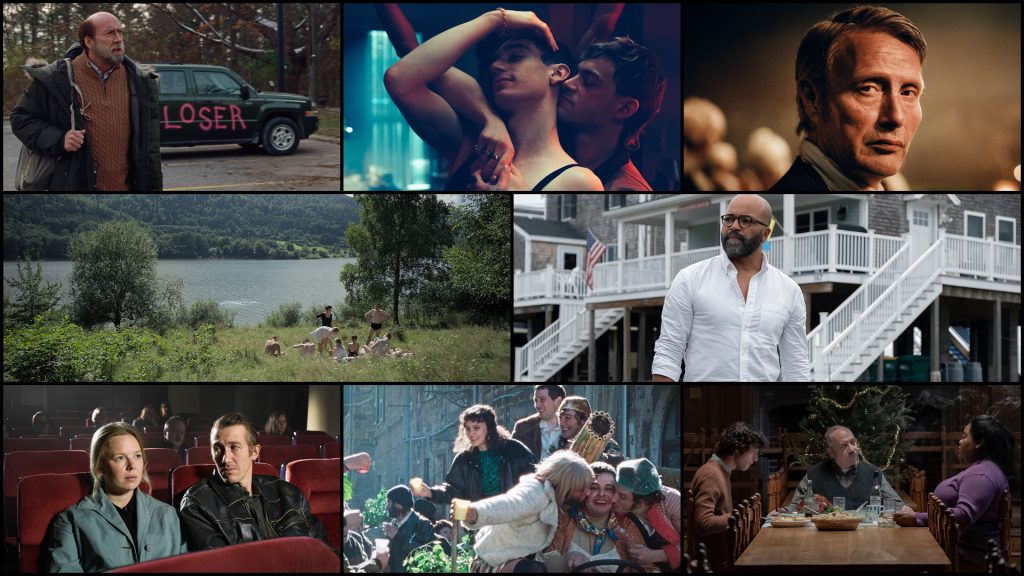Reviews include Superman, Apocalypse in the Tropics, and To a Land Unknown.
Member Survey: TIFF 2023 – Best of the Fest
September 18, 2023

All photos courtesy of TIFF
Another year for the Toronto International Film Festival is in the can. This year’s event evoked TIFF’s formative spirit as “the festival of festivals.” Most of the favourites between critics and audiences alike were highlights from other festivals with Cannes winner Anatomy of a Fall setting the pace for the festival with a line that ran from Cineplex Scotiabank to Hooters at 8:00am on opening day, proving that festival buzz often outweighs premiere status for the critics. On the other hand, the TIFF audience cast its ballots for one of Toronto’s breakout titles, American Fiction, which scooped the People’s Choice Award as many of our critics were predicting.
The critics’ choices, however, generally fell to buzz-worthy Cannes titles that set the bar for eleven days of moviegoing. The TFCA invited all members to submit their picks for the best films of this year’s Toronto International Film Festival. 10 films received top votes with only one title, Johnathan Glazer’s The Zone of Interest, receiving multiple votes, making it an easy critical favourite of TIFF 2023. The Sorrentino, however, failed to receive a single vote for the second year running.
Here are the TFCA members’ picks for the best films at TIFF 2023
Anne Brodie: La Chimera – Magical, gritty, wondrous, and criminally intriguing, Alice Rohrwacher’s Le Chimera has real style, harking back to the New Wave and all those fabulous films that came out of Italy in the ’50s, ’60s, and ’70s. Hélène Louvart’s cinematography (35mm, Super 16, and 16mm) is careful and incisive, creating mysteries with unexpected, effective angles, movements, and little surprises along the way. Rohrwacher’s uncomfortable and beautiful portrait of men in trouble and loving it, made by women, is a treat. And you’d swear it was shot fifty years ago.
Alicia Fletcher: Fallen Leaves – A bittersweet hug from a master filmmaker whose hopefully empty threat of retirement terrifies me, Aki Kaurismäki’s Fallen Leaves was my favourite film of the fest. His 20th feature film in his forty years of filmmaking, Fallen Leaves sees Finland’s greatest contemporary filmmaker return to the themes and tones of his beloved Proletariat trilogy of 1986-1990. And like those films (Shadows in Paradise, Ariel, The Match Factory Girl), Fallen Leaves is a tragicomic portrait of unspectacular underdogs, replete with all the Kaurismäki underpinnings: carpeted dive bars with jewel box jukeboxes, pompadoured troubadours, stalwart canine sidekicks, gentle nods to cinematic greats like Bresson, Ozu, Chaplin, and a tongue-in-cheek tribute to Jim Jarmusch, the filmmaker who has benefitted most from Kaurismäki’s distinct mood.
While Kaurismäki regulars make appearances, Fallen Leaves stars two newcomers to his troupe—Alma Pöysti as precariously employed grocery stockist Ansa, and Jussi Vatanen as Holappa, a cantankerous dipsomaniac construction worker smitten with Ansa after a brief encounter. Each commit memorable and delicate performances. As great as any of Kaurismäki’s many masterpieces, Fallen Leaves balances global injustices, such as the war in Ukraine, with small, personal defeats related to capitalism run amuck, and yet it never feels trite or unearned. Let’s hope Finland’s melancholic maestro keeps pushing, as his filmmaking has never felt more relevant.
Marc Glassman: Perfect Days – Perfect Days is this year’s number one for me, not just because of the quality of the film but I love that this is truly a comeback story. The extraordinary Wim Wenders will always have a place in the hearts of filmgoers for his brilliant 1980s films Paris Texas and Wings of Desire but in the past 30 years, most of his narrative features have only proven to be minor successes. It’s been his docs, particularly Pina and Buena Vista Social Club, which have kept him in the front ranks of the filmmaking conversation. But not now.
Perfect Days is truly great: a mysterious humanistic drama of power and beauty. Koji Yakusho, an iconic Japanese actor, is absolutely persuasive as Hirayama, who is making his living cleaning toilets. Perhaps the best thing about this film is that Wenders refuses to explain what caused Hirayama to live in such circumstances. At the end, the camera views him, face-on, in his van. His look is extraordinary: deep, peaceful and even occasionally joyful.
Barry Hertz: The Zone of Interest – I watched a screening of The Zone of Interest about a week before the festival began, and after 30-plus more movies, there wasn’t a single feature that could touch the sheer inventiveness or raw power of Jonathan Glazer’s sterile horror show. Perhaps not so much about the banality of evil as it is about the pernicious selfishness that fuels moral decay, the film offers an unlikely portrait of the men and women who helped fuel the Holocaust. I don’t think I’ll see a more chilling, perfectly engineered, soul-flattening film this year — though I’m eager to engage with, and argue against, the inevitable dissent.
Rachel Ho: The Holdovers – Rather unfairly, I was really ready to dislike The Holdovers but it turned out to be an absolute delight and my favourite of the festival. Paul Giamatti and Da’Vine Joy Randolph deliver hilarious and heartfelt performances, but it’s newcomer Dominic Sessa who steals the show. A charming turn that illustrates the ups and downs of youth, Sessa makes an impressive debut. Alexander Payne’s best film in well over a decade, The Holdovers is a warm blanket holiday film and a much needed tonic to the heavier fare at TIFF.
Peter Howell:
Best Cannes Acquisition: The Zone of Interest – A nightmare bathed in sunshine. Jonathan Glazer presents the blissful Nazi family in the garden estate across from the ovens of Auschwitz, who seek to ignore the reality of their inhumanity. An icy masterpiece.
Best Toronto Discovery: Woman of the Hour – Anna Kendrick’s splendid directing debut, an astute thriller, plays almost like the anti-Barbie. It similarly scalpels gender stereotypes but not for laughs (although there are some), in fact-based shocker of a serial killer who got on TV’s The Dating Game.
Most Rocking Cinema Experience: Stop Making Sense – The IMAX screening at Scotiabank Theatre of Jonathan Demme’s restored 1984 concert classic, with the reunited Talking Heads present and together for the first time in 21 years.
Brian D. Johnson: The Zone of Interest – Of everything I saw TIFF, Jonathan Glazer’s chilling adaptation of the Martin Amis novel had the most enduring impact—especially in how it influenced the way I saw the other films at the festival. This portrait of Nazi commandant Rudolph Höss and his family trying maintain a bucolic household next door to Auschwitz conveys unspeakable horror without showing it. And with virtually no concessions to movie tropes. No close-ups. No performative moments. (Despite Sandra Hüller’s impeccable acting as the commandant’s wife, it’s her virtuoso turn in Anatomy of a Fall that will get the Oscar nom.) Using an array of remotely operated fixed cameras, Glazer holds the characters at an agonizing clinical distance. Even beauty looks toxic under his monochrome palette as the “background” of chimney smoke and screams beyond the garden wall gradually penetrate the family’s bubble of repression. It hard to watch. But after Zone, seeing films employ Hollywood tropes to portray real-life atrocities (such as Lee) became more unbearable. My other faves: Swan Song, The Pigeon Tunnel, Woman of the Hour.
Chris Knight: American Fiction – I was so happy to see such a worthy film win the People’s Choice Award this year. (I feared Taika Waititi’s crowd-pleasing but thin Next Goal Wins might take the cake.) Like a next-generation Bamboozled, American Fiction wrings uncomfortable, even guilty laughter from its audience. Jeffrey Wright might get his first Oscar nomination for playing Thelonious “Monk” Ellison, a respected (but not very successful) author who writes a hackneyed “Black” novel in protest against what he sees as the commodification of a narrow sliver of the Black American experience. Then he watches, aghast, as My Pafology is published to great acclaim, and optioned for a movie adaptation. Writer and first-time director Cord Jefferson, working from Percival Everett’s novel Erasure, delivers a great piece of satire.
Pat Mullen: Solo – It’s refreshing to see a drama like Solo take queer cinema beyond coming out narratives and stories of acceptance, suicide, and bullying. It’s doubly so thanks to the fabulous environment that Sophie Dupuis creates for her characters, offering a backstage drama that celebrates the drag scene, but finds great drama in the cattiness among queens. Dupuis delivers a love letter to Montreal’s ballroom scene with a vibrant film drenched in beautiful colours and fuelled by a soundtrack of banger club anthems. While the film shows that Dupuis really is one of the Canadian directors to watch after Family First and Underground, Solo also proves star Théodore Pellerin as one of the best actors of his generation. The actor gives a tour-de-force performance as Simon, aka drag queen Glory Gore, who gets tangled up in a toxic relationship with a fellow drag queen (Félix Maritaud). As Simon rediscovers what it means to own the spotlight, one sees Pellerin truly come into his own as an actor. (And he can really work a runway in heels!) Simon’s hunger for the stage resonates strongly, but his eyes carry the weight of imposter syndrome that many people in the audience will recognize all too well. Solo is an easy choice for best Canadian film of the festival, if not the year. Honourable mentions: The Holdovers, Swan Song, The Zone of Interest, Mountain Queen, Pictures of Ghosts, NYAD, Menus-Plaisirs Les Troisgros.
Gilbert Seah: The Promised Land – The Promised Land comes across as an efficient enough film, epic in emotional and storytelling proportions that come with an all-important message to boot. It is a gripping adventure drama, compelling and riveting from start to finish. Mads Mikkelsen stars as Ludvig Kahlen, the illegitimate son of a maid and a nobleman, who defied his low status to succeed in Denmark’s military. He took 25 years to attain the position of captain whereas a nobleman with royal blood would have taken much less time. He demands more! But director Nikolas Arcel slowly but surely demonstrates that ambition, wealth and fortune are inferior traits to charity, kindness and devotion. The cinematography depicting the harsh blowing winter snow and ice demands mention. The Promised Land aka Bastarden displays filmmaking at its best, executed with verve and conviction, by a director and actor both at the top of their form.
Jim Slotek: Dream Scenario – The dynamic of fame in this toxic era is wonderfully, cleverly and nightmarishly dissected in this surrealist film about a nebbish college teacher (Nicolas Cage) who makes innocuous appearances in millions of people’s dreams – becoming famous IRL in the process. As the fame turns ugly, so too do the dreams, and the blowback. The demented hand of co-producer Ari Aster is felt in Kristoffer Borgli’s film, and few actors can go from benign to off-the-rails as convincingly as Cage. Runner up: The Zone of Interest
Courtney Small: The Zone of Interest – A haunting look at the Holocaust unlike anything I have seen before. By observing the mundane aspects of a Nazi family’s life, Jonathan Glazer creates a meditation on the nature of evil that is equally terrifying and heartbreaking. Honourable mention to the great slate of Canadian works at the festival including Solo, The Queen of My Dreams, Seagrass, Motherland, Kanaval, Fitting In, Bria Mack Gets A Life, etc.



